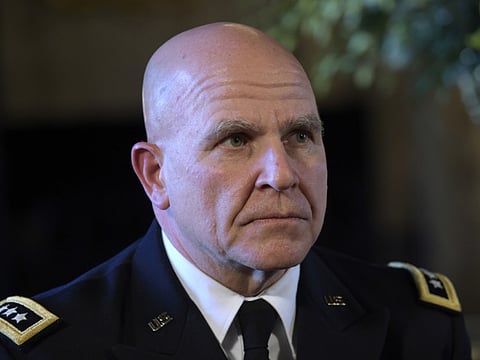Trump nails it with McMaster’s appointment
New national security adviser is likely to bring some hard-nosed realism that is needed to end the chaos in Washington

After a month of chaotic management, marked by ill-advised “Executive Orders”, United States President Donald Trump seems to have finally got it right. He appointed General H.R. McMaster as a National Security Adviser to succeed Michael Flynn who resigned earlier this month over his alleged relations with the Russian ambassador in Washington.
Trump’s first month in the White House was extremely chaotic. It left observers and policy-makers guessing about what was US policy on a number of foreign policy issues; and who was best representing it: The sitting president, who is on record saying that Nato is “obsolete”, or his Vice-President, Mike Pence, who assured America’s long-standing allies across the Atlantic about his administration’s commitment to the security alliance. The attitude of the Trump administration towards the other global powers in Beijing and Moscow was no less confusing.
While Trump has embraced closer ties with Russia, others within his cabinet have only served to intensify conflict with Moscow, with the US ambassador at the United Nations blaming Russia for exacerbating violence in eastern Ukraine. Similarly, Trump’s phone call with the Taiwanese president was seen as an attempt by the new administration to abandon the four-decade long “One China” US Policy. Trump was quick, however, to backtrack.
Trump’s unorthodox approach to the presidency took a dramatic turn during a summit with the Japanese prime minister. The February 13 announcement that North Korea had test-launched a ballistic missile capable of delivering a nuclear warhead coincided with a summit meeting, which brought Trump together with Japanese Prime Minister Shinzo Abe at Florida’s Mar-a-Logo country club — owned by the US president. The table at which the two leaders were having dinner was converted into a makeshift operations centre — right in front of the eyes of club members. In a complete break with established protocols, assistants used the flashlights on their mobile phones to help Abe and Trump read the fine print on classified documents.
By the fourth week of his presidency, the infractions of the Trump White House turned from the semi-farcical to the menacing. The national security adviser, Michael Flynn, had to resign from his position due to allegations that he had misled Pence on the nature of his dealings with Russia’s ambassador to the US prior to taking up his position. This came in the wake of sanctions placed on Moscow by the outgoing administration of former president Barack Obama, due to allegations that the Kremlin was seeking to influence the outcome of the US presidential election.
Chaos in the Trump national security team was not limited to the controversy about Flynn’s misconduct, though. Trump’s decision to remove a number of top technocrats from the National Security Council, including the chairman of the joint chiefs-of-staff and the chief of the National Security Agency (NSA) and appoint Stephen Bannon, one of his chief strategists, in their place, was shocking. Trump did reinstitute the director of the CIA in the National Security Council, but only after a flurry of criticism. Today, the council is facing an exodus of civil servants who feel insecure in this working environment, leaving behind important vacancies in the body. Those who remain are bulking under the partisanship brought in by the White House, and some have taken to purging their social media accounts out of fear of being caught out, criticising the new commander-in-chief.
Taking matters to farcical heights, reports in the media have indicated that many experts in the national intelligence community, including both the CIA and the NSA, are working to shield the president from a number of the most sensitive classified reports — out of fears that sensitive information might get leaked. Staff within America’s national security establishment have complained that they are being asked to condense their reports, and to replace words with diagrams and maps where possible, as the new president, apparently, is not a big reader. Other mandarins within Washington are now considering engaging with the president directly on Twitter as a means of helping to craft national policy, given Trump’s fondness for the medium as a platform to share his views.
Trump’s presidency cannot simply be measured according to any standard criteria. The conflict between him as a populist president and the erstwhile stable institutions of America that he is meant to lead is likely to continue. Yet, the appointment of McMaster will most probably lead to a more thoughtful approach by the White House, many hope. Given his personal and professional characteristics, McMaster will more likely “bring in some hard-nosed realism of what [politics] looks like,” as the New York Times put it.
Dr Marwan Kabalan is a Syrian academic and writer.


